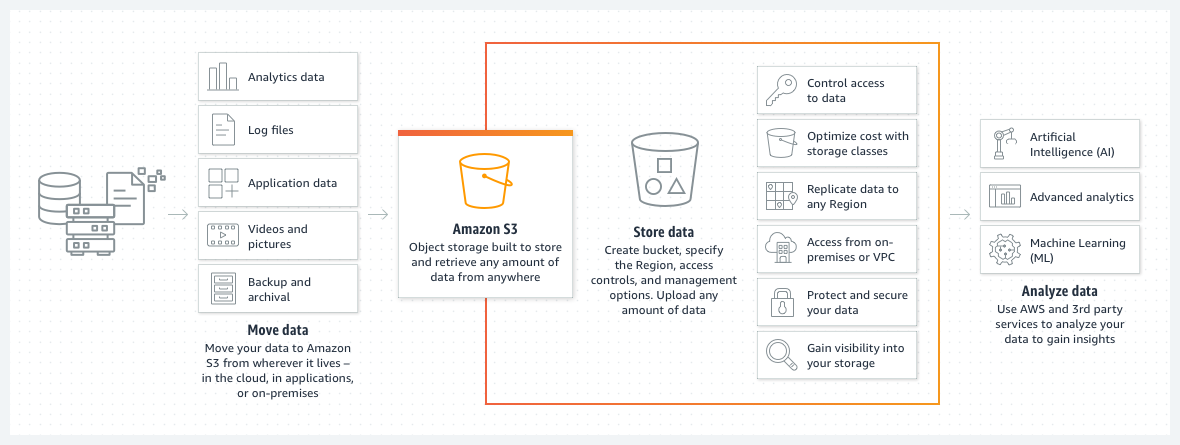Creating Signed URLs with AWS S3
AWS offers many many services, and AWS S3 ( Simple Storage Service ) is one of the most fundemantal one ( This service is where i earn my living ). It allows you to store your content reliably and makes it available from any where in the world ( as long as you have internet connection ). Here is a beatiful graphic (see references for original content) that summarizes the capabilities of AWS S3:

This blog post is only about creating signed urls to share files securely to a limited audience. This scenario pops up very frequently for me when building software solutions, You do not want to grant access to your AWS S3 bucket but want to share a single object for a limited time. AWS S3 lets you achieve this via signed urls. A signed URL permits accessing to a single object within AWS S3. It contains the necessary authentication&authorization information and it also has an expiration ( you can create URLs valid for only 1 hour ). You can grant access to download an existing object and also grant access to upload an object as well.
So how we create them ? Below is a piece of code ( part of my battle tested, production ready AWSS3Client ) that demonstrates how to:
and as always, read the documentation from here AWS JavaScript SDK and look for:
- @aws-sdk/client-s3
- @aws-sdk/s3-request-presigner
import {
PutObjectCommand,
PutObjectCommandOutput,
GetObjectCommand,
S3Client,
} from "@aws-sdk/client-s3";
import { getSignedUrl } from "@aws-sdk/s3-request-presigner";
import { ReadStream } from "fs";
export class AWSS3Client {
private s3BucketName: string;
private awsS3Client: S3Client;
constructor(
s3BucketName: string,
accessKeyId: string,
awsSecretAccessKey: string,
awsRegion: string
) {
this.s3BucketName = s3BucketName;
this.awsS3Client = new S3Client({
credentials: {
accessKeyId: accessKeyId,
secretAccessKey: awsSecretAccessKey,
},
region: awsRegion,
});
}
async createUploadSignedUrl(
objectKey: string,
expiresInSeconds = 3600
): Promise<string> {
const command = new PutObjectCommand({
Bucket: this.s3BucketName,
Key: objectKey,
});
return getSignedUrl(this.awsS3Client, command, {
expiresIn: expiresInSeconds,
});
}
async createDownloadSignedUrl(
objectKey: string,
expiresIn = 3600
): Promise<string> {
const command = new GetObjectCommand({
Bucket: this.s3BucketName,
Key: objectKey,
});
return getSignedUrl(this.awsS3Client, command, { expiresIn });
}
}
const s3BucketName = process.env.S3_BUCKET_NAME;
if (!s3BucketName) throw new Error("S3_BUCKET_NAME is not defined");
const accessKeyId = process.env.AWS_ACCESS_KEY_ID;
if (!accessKeyId) throw new Error("AWS_ACCESS_KEY_ID is not defined");
const awsSecretAccessKey = process.env.AWS_SECRET_ACCESS_KEY;
if (!awsSecretAccessKey)
throw new Error("AWS_SECRET_ACCESS_KEY is not defined");
const awsRegion = process.env.AWS_REGION;
if (!awsRegion) throw new Error("AWS_REGION is not defined");
export const awsS3Client = new AWSS3Client(
s3BucketName,
accessKeyId,
awsSecretAccessKey,
awsRegion
);